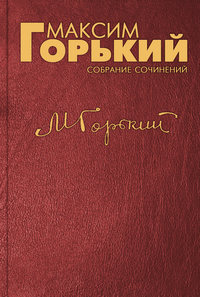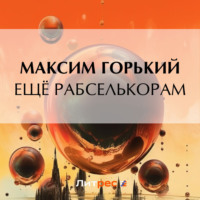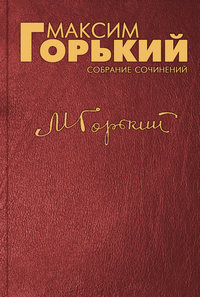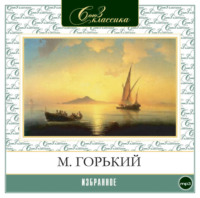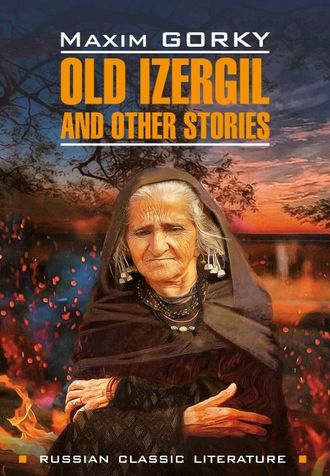
Полная версия
Old Izergil and other stories / Старуха Изергиль и другие рассказы. Книга для чтения на английском языке
She continued:
“I found it hard to live in Poland. The people there are false and cold-blooded. And I could not speak their snake-like tongue that does nothing but hiss. Why do they hiss? God gave them a snake-like tongue because they are so false. And so I set off, I knew not for where, and saw the Poles getting ready to rise up against you Russians. I came to the town of Bochnia. There a certain Jew bought me, not for himself, but to trade with my body. I agreed to this. One has to know how to do something if he is to earn a living; I did not know how to do anything, and I paid for it with my body. But I resolved that if I could get enough money to take me back to my native town on the Birlat, I would break my bonds, however fast they were. I could not complain of my life there. Rich gentlemen came and feasted with me. That cost them big sums. They fought with each other over me and were brought to ruin. One of them tried for a long time to win my heart, and at last this is what he did: he came with his servant, who was carrying a big sack, and he emptied the sack over my head. Gold coins came showering down over me and it cheered my heart to hear their ring as they struck the floor. And yet I turned the man out. He had a fat greasy face and his belly was as puffy as a pillow. He looked like a stuffed pig. Yes, I turned him out, even though he told me he had sold all his land and his house and his horses to bring me that gold. But by that time I was in love with a worthy gentleman with a scarred face. His face was criss-crossed with scars left by Turkish sabres. He had just come back from helping the Greeks fight the Turks. There was a man for you! What were the Greeks to him, a Pole? Yet he went and helped them fight their enemy. The Turks marred him cruelly – under their blows he lost an eye and two fingers of the left hand. What were the Greeks to him, a Pole? Yet he fought for them, and he did this because he yearned to do brave deeds, and when a man yearns to do brave deeds, he will always find an opportunity. Life is full of such opportunities, and if a man does not find them, it is because he is lazy or cowardly or does not understand life, for if he understands, he is sure to want to leave some memory of himself behind him. And if everyone wished to do this, life would not gobble people up without leaving a trace of them. A very fine man he was, he with the scarred face. He would have gone to the ends of the earth to do a good deed. I am afraid your people killed him in the uprising. Why did you go to fight the Magyars? But hush, say nothing.”
And admonishing me to hold my tongue, old Izergil herself grew silent and thoughtful.
“I knew a certain Magyar. One day he left me – it was in the depths of winter – and in the spring, when the snow melted, they found him in a field with a bullet through his head. As many people die of love as of the plague – quite as many, if they were to be counted. But what was I talking about? Ah, yes, about Poland. It was there I played my last game. I happened to meet a gentleman who was very handsome, devilishly handsome. But by that time I was old. Ugh, so old! I must have been forty by then – at least forty. And he was proud and had been pampered by the women. I came to love him dearly. He thought I would be his for the asking, but I did not give myself up so easily. Never had I been the slave of anyone, and by that time I had broken off with the Jew, which cost me a pretty penny, I can tell you. I was living in Krakow in fine style, with horses and gold and servants and everything else I wanted. He came to see me, the proud demon, and expected me to throw myself into his arms. A pitched battle took place between us. I grew haggard under the strain, for it lasted a long time, but at last I won. He fell on his knees before me. But no sooner had he got me than he cast me off. Then I knew I had grown old, and a bitter realization it was. Very bitter. I loved him, the fiend, and he would laugh in my face when he met me. He was a beast. And he would speak mockingly of me to others, and I knew it. Oh, how I suffered! But there he was, always near me, and I doted on him in spite of everything. And then one day he went away to fight the Russians. I could not bear it. I tried to take myself in hand, but I could not master my feelings. I decided to go to him. He was stationed in a wood near Warsaw.
“But when I got there I found out that your soldiers had beaten them and he had been taken prisoner and was being held in a village not far away.
“‘In other words, I shall never see him again!’ I thought to myself. And I wanted desperately to see him. So I thought of a way to do so. I dressed myself as a beggar-woman, pretended to be lame, covered my face, and set out for the village where he was imprisoned. I found it full of soldiers and Cossacks; it cost me dear to stay there. When I found out where the Poles were, I realized it would be very hard to reach them. But reach them I must. And so one night I set out. As I was crawling between the beds of a vegetable garden I saw a sentry standing in front of me. I could hear the Poles singing and talking in loud voices. They were singing a song to the Virgin, and my Arkadek was singing with them. And I remembered with bitterness that once men had crawled after me, and now here was I crawling like a worm after a man, perhaps crawling to my death. The sentry had pricked up his ears and was leaning forward. What was I to do? I stood up and went towards him. I did not have a knife or any other weapon with me – nothing but my hands and my tongue. I was sorry I had not taken a knife with me. The sentry levelled his bayonet at my throat, and I whispered: ‘Wait! Listen to what I have to say and spare my life if you have a heart in your breast. I have nothing to offer you, but I beg your mercy.’ He lowered his gun and whispered: ‘Go away, old woman. Go away. What brings you here?’ And I said that my son was imprisoned there. ‘My son, soldier; does that mean nothing to you? You, too, are somebody’s son. Then look at me and understand that I have a son like you, and that he is imprisoned here. Let me have one look at him. Perhaps he must die soon, and perhaps you, too, will be killed on the morrow. Will your mother not shed tears over you? And will it not be hard for you to die without a last look at her, your mother? It will be just as hard for any son. Take pity on yourself, and on him, and on me, his mother!’
“How long I stood there trying to persuade him! The rain poured down, drenching us. The wind blew and wailed, buffeting me now in the back, now in the chest. And I stood swaying in front of that stony-hearted soldier. He kept saying ‘no,’ and every time I heard that unfeeling word, the desire to see Arkadek flared up hotter within me. As I talked I measured him with my eye – he was small and thin and had a cough. At last I threw myself on the ground in front of him, and, still pleading with him, I seized him round the knees and threw him on the ground. He fell in the mud. Quickly I turned him face down and pressed his head into a puddle to keep him from crying out. He did not cry out, but he struggled to throw me off his back. I took his head in both hands and pushed it deeper into the puddle. He was suffocated. Then I rushed over to the barn where the Poles were singing. ‘Arkadek!’ I whispered through a chink in the wall. They are sly fellows, those Poles, and so they did not stop singing on hearing me. But suddenly I saw his eyes opposite mine. ‘Can you get out of here?’ I asked. ‘Yes, under the wall,’ he said. ‘Then come quickly.’ And so four of them crawled out of the barn, my Arkadek among them. ‘Where is the sentry?’ asked Arkadek. ‘There he lies.’ Then they crept away as quietly as possible, bent almost double. The rain kept coming down and the wind wailed loudly. We reached the end of the village and walked on through the woods for a long time without saying a word. We walked quickly. Arkadek held my hand in his, and his hand was hot and trembling. Oh, how good it was to walk there beside him as long as he kept silent! They were my last moments – the last happy moments of an insatiable life! But at last we came to a meadow, and there we stopped. All four of them thanked me for what I had done. They talked on and on – I thought they would never stop – and as I listened to them I kept feasting my eyes on Arkadek. How would he treat me now? And he put his arms about me and said something in a very pompous tone, I do not remember just what he said, but it was something to the effect that he would love me for having set him free, and he knelt before me and said with a smile: ‘My queen!’ Ugh, what a false dog he was! I gave him a kick and would have slapped him in the face, but he sprang aside and leapt to his feet. And he stood before me, very grim and white. And the other three stood there looking sullen and saying not a word. I stared back at them. And I remember that a great weariness and indifference came over me. And I said to them: ‘Go your way.’ And they said to me, the dogs: ‘And will you go back and tell them in what direction we have gone?’ That is what beasts they were. But they went away. And I, too, went away. And on the next day your soldiers caught me, but they did not keep me long. Then I realized it was time for me to make a home for myself – the life of a cuckoo was a thing of the past. My body had grown heavy, my wings feeble, my feathers dull. I was old, I was old. And so I went to Galicia, and from there to Dobruja. For the last thirty years I have been living here. I had a husband, a Moldavian, but he died about a year ago. And I go on living. All alone. No, not alone – with them —” and the old woman pointed to the waves. They were quiet now. Now and again there would be a faint suggestion of sound that died away as soon as it was born.
“They love me. I tell them many tales, and they like them. They are so young. I feel happy with them. I gaze at them and think: ‘Time was when I was as they are. But in my day people had more strength and fire, and that made life gayer and more worth while. It did indeed.’”
She relapsed into silence again. I felt sad, sitting there beside her. Soon she dozed off, nodding her head and muttering something, perhaps a prayer, under her breath.
A thick dark cloud with the jagged outlines of a mountain range rose out of the sea and moved towards the steppe. A wisp was torn off its highest tip and went flying ahead, putting out the stars one by one. The sea began to murmur. A sound of kissing, of whispering, and of sighing came from the grape-arbour not far away. A dog howled out in the steppe. The air was filled with a strange odour that pricked the nostrils and made one’s nerves tingle. The clouds cast dark clusters of shadow which crept over the earth, now fading, now growing sharply distinct. Nothing remained of the moon but a vague opalescent glow that at times was completely blotted out by a bit of cloud. Tiny blue lights flickered far out in the steppe, which now had become dark and lowering, as if something fearful were lurking there. The lights flared up as if people were wandering over the steppe in search of something, lighting matches which the wind instantly blew out. They were very strange, these blue lights, and suggested the fantastic.
“Do you see any sparks out there?” asked Izergil.
“Those little blue lights?” said I, pointing out to the steppe.
“Blue? Yes, those little lights. So they are still to be seen! But not by my eyes. There are many things I do not see any more.”
“Where do they come from?” I asked the old woman.
I had already heard one explanation of them, but I wanted to hear what old Izergil would say.
“They come from the flaming heart of Danko. Once upon a time there was a heart that broke into flame, and those sparks are what is left of it. I shall tell you that tale. It, too, is old. Everything is old. See how many fine things there were in olden times! Today there is nothing – no men, no deeds, no tales – that can be compared with those of olden times. Why is that so? Come, tell me. Ah, you cannot. What do you know? What do any of you young people know? If you searched the past you would find the answer to all life’s riddles. But you do not, and so you know nothing. Think you I do not see what is happening? I see only too well, even if my eyes have grown weak. And I see that instead of living, people spend their whole lives getting ready to live. And when they have robbed themselves by wasting all that time, they blame it on fate. What has fate to do with it? Each man is his own fate. There are all sorts of people in the world today, but I see no strong ones among them. What has become of them? And the handsome ones are growing fewer and fewer.”
The old woman stopped to reflect on what had become of the strong and the handsome, and as she mused she gazed out into the dark steppe, as if searching for the answer there, I waited in silence until she should begin her tale, fearing that any comment would distract her. And presently she began.
III
“Long, long ago there lived some people in a place that was bounded on three sides by impenetrable forests and on the fourth by the steppe. They were a strong, brave, and cheerful people, but evil times came upon them. Other tribes put in an appearance and drove them into the depths of the forest. The forest was dark and swampy, for it was very ancient, and the boughs of the trees were so closely interwoven that they shut out the view of the sky, and the sun’s rays had all they could do to pierce the thick foliage and reach the waters of the swamp. And wherever they reached those waters, poisonous vapours arose, and the people began to take sick and die. Then the women and children of that tribe began to weep, and the men brooded on what had happened and grew despondent. There was nothing for it but to get out of the forest, but there were only two means of getting out: one of them was to go back over the road they had come, but at the end of this road strong and vicious foes awaited them; the other was to push forward through the forest, but here they would come up against the giant trees whose mighty branches were closely entwined and whose gnarled roots were sunk deep into the mire of the bogs. These stone-like trees stood silent and motionless in the grey gloom of daylight, and they seemed to close in upon the people at nightfall when the fires were lit. And always, day and night, this tribe, born to the freedom of the steppe, was walled in by shadows that seemed waiting to crush them. Most fearful of all was the wind that went wailing through the tops of the trees, causing the whole forest to sing a grim dirge to the people imprisoned there. They were, as I have said, a brave people, and they would have fought to the death with those who had once defeated them, had they not feared being wiped out in the fight: they had their ideals to defend, and if they perished, their ideals would perish with them. And for that reason they sat pondering their fate through the long nights, with the poisonous vapours rising all around them and the forest singing its mournful song. And as they sat there, the shadows of the fires leaped about them in a soundless dance, and it seemed as if it were not mere shadows that were dancing, but the evil spirits of forest and bog celebrating their triumph. And nothing, not even work or women, can exhaust a man as do despondent thoughts. The men grew weak from brooding. Fear was born in their hearts, binding their strong arms; terror gripped them as they listened to the women wailing over the bodies of those who had died of the poisonous vapours or lamenting over the fate of the living made helpless by fear. And cowardly words came to be spoken in the forest – at first softly and timidly, but louder and louder as time went on. And at last the people thought of going to the enemy and making him a gift of their freedom. So frightened were they by the thought of death that not one of them shrank from living the life of a slave. But at this moment Danko appeared and saved them from such a fate.”
The old woman, it seems, had often recounted this tale about the flaming heart of Danko. As she intoned it in her hoarse crackling voice, I seemed to hear the sounds of the forest, in whose depths these unfortunate exiles were poisoned to death.
“Danko was one of them, and he was young and handsome. Handsome people are always courageous. And he said to his comrades:
“‘Stones are not to be removed by thinking. He who does naught will come to naught. Why should we exhaust our energies thinking and brooding? Arise, and let us go through the forest until we come out at the other end; after all, it must have an end – everything has an end. Come, let us set forth!’
“They looked at him and saw that he was the best man among them, for his eyes were aglow with life and strength.
“‘Lead us,’ they said.
“And he led them.”
The old woman stopped talking and gazed out over the steppe, which was growing darker and darker. Sparks from the flaming heart of Danko flared up in the distance like ethereal blue flowers that bloomed but for a moment.
“And so he led them, Danko. And they followed him willingly, for they believed in him. It was a difficult path. It was dark, and at every step the yawning bogs swallowed people up, and the trees were like a mighty wall barring the way. Their branches were closely interwoven, their roots were like snakes reaching out in every direction, and every step these people took cost them blood and sweat. For a long time they went on, and the further they went, the thicker grew the forest and the weaker grew their limbs. And then they began to murmur against Danko, saying that he was young and inexperienced and had no right to bring them here. But he kept walking at their head, his spirit undaunted, his mind unclouded.
“But one day a storm broke over the forest, and the trees whispered together menacingly. And instantly it became as dark as if here were gathered all the nights that had passed since the forest was born. And the little people walked on under the big trees amid the roar of the storm, and as they walked the giant trees creaked and sang a sinister song, and the lightning flashed above the tree-tops, throwing a cold blue light over the forest for a brief instant, disappearing as quickly as it had appeared and striking terror into the hearts of the people. And in the cold flashes of the lightning the trees seemed to be live things that were stretching out long gnarled arms and weaving them into a net to catch these people who were trying to escape from darkness. And something cold and dark and fearful peered at them through the dark foliage. It was a difficult path, and the people who had set out on it grew exhausted and lost heart. But they were ashamed to admit their weakness, and so they poured out their anger and resentment on Danko, who was walking at their head. They began to accuse him of being incapable of leading them.
“They came to a halt, and, tired and angry, they began to upbraid him there in the quivering darkness, amid the triumphant roar of the storm.
“‘You are a despicable and evil creature who has brought us to grief,’ they said. ‘You have exhausted us by leading us here, and for that you shall die.’
“‘You said: “Lead us!” and I led you,’ cried out Danko, turning to face them. ‘I have the courage to lead you, and that is why I undertook to do it. But you? What have you done to help yourselves? You have done nothing but follow me, without so much as husbanding your strength for the greater march. You merely followed me like a flock of sheep.’
“His words only infuriated them the more.
“‘You shall die! You shall die!’ they shrieked.
“The forest roared and echoed their cries, and the lightning tore the darkness to shreds. Danko gazed upon those for whose sake he had undertaken such great labour, and he saw that they were like wild beasts. Many people were pressing about him, but he could detect no signs of humanity in their faces and he knew that he could expect no mercy from them. Then resentment seethed in his breast, but it was quelled by compassion. He loved these people, and he feared that without him they would perish. And the flames of a great yearning to save them and lead them out on to an easy path leaped up in his heart, and these mighty flames were reflected in his eyes. And seeing this, the people thought he was enraged; they thought that was why his eyes flashed so. And they instantly grew wary, like wolves, expecting him to throw himself against them, and they drew closer about him that they might seize him and kill him. He saw what they were thinking, but the flames in his heart only flared up the brighter, for their thoughts added the oil of sorrow to the flames of his yearning.
“And the forest went on singing its mournful song, and the thunder crashed, and the rain poured down.
“‘What else can I do to save these people?’ cried out Danko above the thunder.
“And suddenly he ripped open his breast and tore out his heart and held it high above his head.
“It shone like the sun, even brighter than the sun, and the raging forest was subdued and lighted up by this torch, the torch of a great love for mankind, and the darkness retreated before it and plunged, quivering, into a yawning bog in the depths of the forest. And in their astonishment the people were as if turned to stone.
“‘Follow me!’ cried Danko, and he rushed forward, holding his flaming heart high above his head to light the way.
“And the people followed him as if under a spell. And once more the forest began to murmur and wave its tree-tops in wonder. But its murmur was drowned out by the sound of running feet. The people were running ahead boldly and swiftly, lured on by the wonderful vision of the flaming heart. And even now there were those who perished, but they perished without tears and complaints. And Danko went on ahead of them, his heart flaming brighter and brighter.
“And suddenly the forest in front of them parted; it parted to make way for them and then closed behind them, a mute and solid wall, and Danko and his followers plunged into a sea of sunlight and rain-washed air. The storm was now behind them over the forest, while here the sun shone, the steppe throbbed with life, the grass was hung with diamond rain-drops and the river was streaked with gold. It was evening, and the rays of the sunset painted the river as red as the blood which poured in a hot stream from the wound in Danko’s breast.
“The brave Danko cast his eye over the endless steppe, cast a joyful eye over this land of freedom, and gave a proud laugh. And then he fell, down and died.
“And his followers were so full of joy and hope that they did not notice he had died and that his brave heart was still flaming beside his dead body. But one timid creature noticed it and, fearing he knew not what, stamped on the flaming heart. And it sent up a shower of sparks and went out.
“And that is why blue sparks are always to be seen in the steppe before a thunder-storm.”
As the old woman finished her beautiful tale, the steppe grew incredibly still, as if overawed by the strength of the brave Danko, who set fire to his own heart for the sake of his fellow-men and died without seeking the least reward for what he had done.
The old woman dozed off. And as I looked at her I wondered how many more tales and memories her mind contained. And I ruminated on the flaming heart of Danko and on the power of the human imagination, which has created so many beautiful and inspiring legends.
The wind blew the rags off the bony chest of old Izergil, who had fallen fast asleep by this time. I covered up her old body and lay down on the ground beside her. It was dark and still in the steppe. Clouds floated slowly… wearily… across the sky, and the sea murmured softly… mournfully…
1894Chelkash
The blue southern sky was so obscured by dust that it had a murky look. The hot sun stared down at the greenish sea as through a thin grey veil, and its rays found poor reflection in the water, churned up as it was by the strokes of oars, the propellers of steamers and the sharp keels of Turkish feluccas and other craft which ploughed the crowded harbour in all directions. The waves of the sea, crushed within their granite encasements by the enormous weights gliding over their surfaces, hurled themselves at the shore and the sides of the ships – hurled themselves growling and foaming, their flanks littered with all sorts of rubbish.





